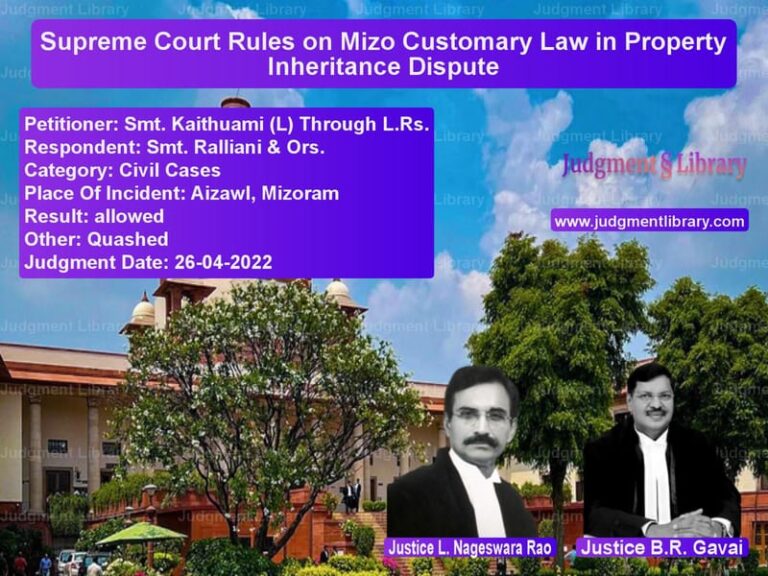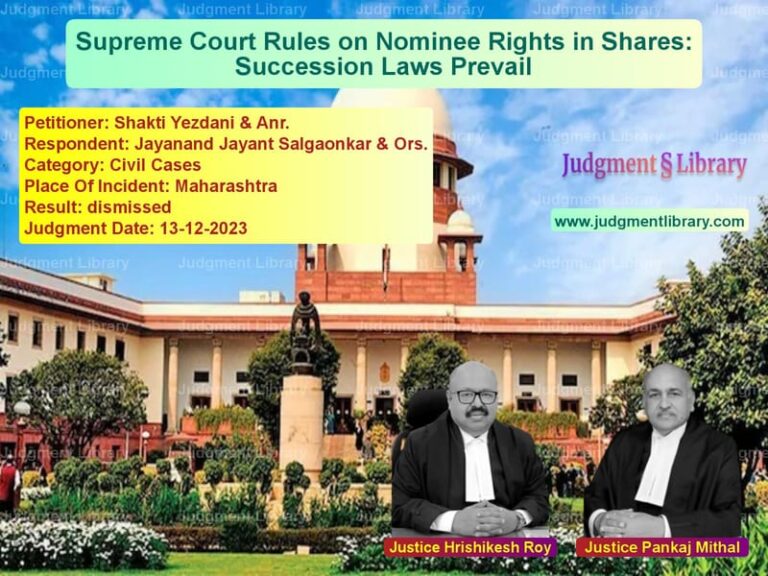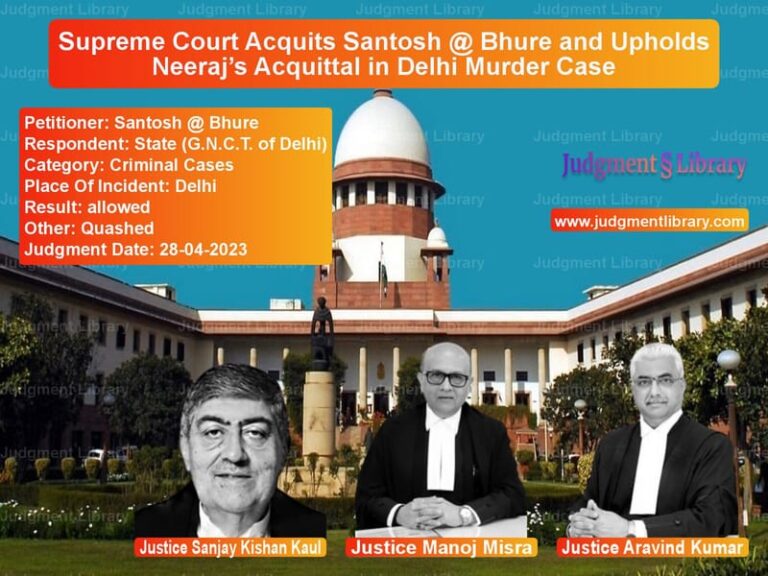Understanding Legal Heirs’ Rights in Partnership Firms: A Detailed Analysis of the Supreme Court Ruling
The case of Rajendra Bajoria and Others v. Hemant Kumar Jalan and Others is a significant judgment by the Supreme Court of India that clarifies the rights of legal heirs in a partnership firm. The case arose from a dispute over the assets and management of the firm ‘Soorajmull Nagarmull’ and raised important legal questions regarding the dissolution of a firm and the rights of legal heirs of deceased partners.
The primary issue in this case was whether the legal heirs of deceased partners had any right to claim ownership over the assets of the firm or to seek its dissolution. The plaintiffs, who were heirs of the original partners, argued that they were entitled to inherit the firm’s assets. However, the defendants contended that only partners of the firm had such rights, and since the plaintiffs were not partners, they could not make such claims.
Background of the Case
The partnership firm ‘Soorajmull Nagarmull’ was constituted under a partnership deed dated December 6, 1943. The original partners included Baijnath Jalan, Mohanlal Jalan, Babulal Jalan, Sewbhagwan Jalan, Keshabdeo Jalan, Nandkishore Jalan, Deokinandan Jalan, Chiranjilal Bajoria, and Kishorilal Jalan. Over time, all the original partners passed away. The plaintiffs in this case were legal heirs of three of the original partners: Chiranjilal Bajoria, Deokinandan Jalan, and Mohanlal Jalan.
The plaintiffs filed a suit before the Calcutta High Court seeking the following reliefs:
- A declaration that they, along with the defendants, were entitled to the firm’s assets.
- A perpetual injunction restraining the defendants from acting as exclusive representatives of the firm.
- A decree directing the dissolution of the firm and the winding up of its affairs.
Defendants’ Arguments
The defendants challenged the suit on several grounds, arguing that:
- The plaintiffs had no right to claim the firm’s assets since they were not partners.
- The firm’s partnership deed explicitly provided that the death of a partner would not lead to automatic dissolution.
- The suit was filed beyond the limitation period and should be dismissed.
High Court’s Decision
The Calcutta High Court initially ruled in favor of the defendants and dismissed the plaintiffs’ suit. The Division Bench of the High Court held that:
- The plaintiffs could not claim ownership of the firm’s assets.
- The dissolution of a partnership could only be sought by an actual partner, not by a legal heir.
- Since none of the reliefs sought in the plaint could be granted under the law, the suit should be dismissed outright.
Being aggrieved by this decision, the plaintiffs filed an appeal before the Supreme Court.
Supreme Court’s Observations
The Supreme Court carefully examined the provisions of the Indian Partnership Act, 1932 and the terms of the partnership deed. The Court observed:
- Under Section 40 of the Indian Partnership Act, a firm can only be dissolved by mutual consent of the partners.
- Section 42 of the Act states that a firm can be dissolved on the death of a partner only if there is no agreement stating otherwise.
- Clause 4 of the partnership deed specifically mentioned that the firm would not dissolve automatically upon the death of any partner.
The Court also noted that Section 44 of the Act allows the dissolution of a firm only at the instance of a partner, not a legal heir.
Judgment of the Supreme Court
The Supreme Court upheld the Calcutta High Court’s ruling and dismissed the plaintiffs’ claims. The Court stated:
“The partners of a firm are entitled only to the profits of the firm, and upon dissolution, they are entitled to the surplus proceeds after settling liabilities. Legal heirs cannot claim ownership over the firm’s assets as co-owners.”
Furthermore, the Court emphasized that:
“If clever drafting creates the illusion of a cause of action, the court should nip it in the bud at the first hearing.”
Thus, the suit was dismissed at the threshold as it failed to disclose a legal cause of action.
Key Takeaways from the Judgment
- Legal heirs of a deceased partner cannot claim direct ownership of a partnership firm’s assets.
- A partnership firm does not dissolve automatically on the death of a partner if the partnership deed states otherwise.
- Only a partner has the legal standing to seek dissolution of a firm.
- The court can reject a plaint if the reliefs sought cannot be granted under the law.
Conclusion
This judgment clarifies an important aspect of partnership law in India. It ensures that legal heirs cannot claim rights that are reserved for partners under the law. The ruling also reinforces the principle that courts must prevent unnecessary litigation by dismissing cases that do not have a valid legal basis. By doing so, the Supreme Court has upheld the sanctity of partnership agreements and provided clear guidance on the rights of legal heirs in business partnerships.
Petitioner Name: Rajendra Bajoria and Others.Respondent Name: Hemant Kumar Jalan and Others.Judgment By: Justice B.R. Gavai, Justice L. Nageswara Rao.Place Of Incident: Calcutta.Judgment Date: 21-09-2021.
Don’t miss out on the full details! Download the complete judgment in PDF format below and gain valuable insights instantly!
Download Judgment: rajendra-bajoria-and-vs-hemant-kumar-jalan-a-supreme-court-of-india-judgment-dated-21-09-2021.pdf
Directly Download Judgment: Directly download this Judgment
See all petitions in Contract Disputes
See all petitions in Property Disputes
See all petitions in Succession and Wills
See all petitions in Specific Performance
See all petitions in Judgment by B R Gavai
See all petitions in Judgment by L. Nageswara Rao
See all petitions in dismissed
See all petitions in supreme court of India judgments September 2021
See all petitions in 2021 judgments
See all posts in Civil Cases Category
See all allowed petitions in Civil Cases Category
See all Dismissed petitions in Civil Cases Category
See all partially allowed petitions in Civil Cases Category







